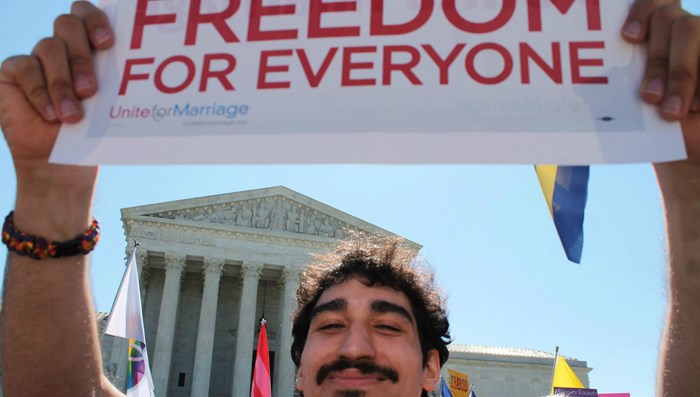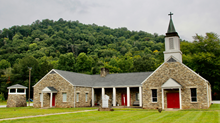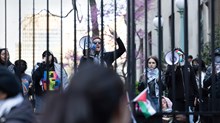
The second act of the national debate over same-sex marriage began this week with a focus on religious liberty.
The Liberty Institute framed Friday’s Supreme Court ruling in favor of same-sex marriage as actually a victory for religious liberty. The assessment was somewhat surprising, given that the group had gathered the Billy Graham Evangelistic Association, the National Religious Broadcasters, Dallas Theological Seminary, Southern Baptist Theology Seminary, Eric Metaxas, Charles Stanley, and other prominent conservative Christians to file an amici brief opposing the court’s approval of same-sex marriage.
But Kelly Shackelford, president of the Plano, Texas-based group, referred to the decision as a 9-0 statement of support for the rights of religious believers.
He pledged to use laws such as the Religious Freedom Restoration Act to make sure the Supreme Court’s promises are heeded.
“We will not allow people of faith to be silenced or censured because of their religious beliefs, and we appreciate that the court unanimously recognized the importance of protecting religious liberty in this area,” Shackelford said in a statement.
In his comments, Shackelford quoted from Justice Anthony Kennedy’s majority opinion in the case.
“The First Amendment ensures that religious organizations and persons are given proper protection as they seek to teach the principles that are so fulfilling and so central to their lives and faiths,” Kennedy wrote, “and to their own deep aspirations to continue the family structure they have long revered.”
Other Christian legal groups were more skeptical.
The Christian Legal Society (CLS) pointed to dissents by Chief Justice John Roberts and Justices Clarence Thomas and Samuel Alito, who warned the court’s decision could have dire consequences for religious supporters of traditional marriage.
“We hope that the justices mean what they say and will protect religious liberty for all Americans – especially those whose religious beliefs adhere to a traditional view of marriage,” CLS said in a statement.
Stanley Carlson-Thies, founder and senior director of the Institutional Religious Freedom Alliance, said that the majority opinion acknowledged that their decision would be controversial. But they fell short in endorsing religious liberty, he told CT.
“As several of the dissenting opinions pointed out, though, the majority opinion did not very strongly affirm the religious freedom of persons and organizations that for religious reasons believe in the historic conception of marriage,” said Carlson-Thies. In a written analysis of the positive and negative aspects of the ruling, he noted:
There is good reason to be concerned that many outside and inside of government will be working to override the freedom for people and organizations to live consistently with their commitment to traditional marriage. Yet there is no good cause for despair. The history and principles of the United States strongly uphold freedom of religion, speech, and association.
The Evangelical Council for Financial Accountability (ECFA) stated the ruling "creates immediate and perhaps far-reaching concerns for nonprofits and churches who remain opposed to same-sex marriage on religious grounds." The ECFA recommended resources for churches and ministries by CLS and Alliance Defending Freedom. "While the effects of this ruling on churches and religious nonprofits could take years to become fully evident, it is crucial for organizations which oppose same-sex marriage on religious grounds to take proactive steps to prepare for the challenges ahead."
"Private institutions that dissent from today's reformulation of marriage must be prepared for aggressive legal attacks on all fronts," Michael McConnell, director of the Constitutional Law Center at Stanford University Law School, told Inside Higher Ed for its exploration of the consequences for Christian colleges. Meanwhile, the Council for Christian Colleges and Universities emphasized Kennedy's nod to the First Amendment, stating the "full protections for religious individuals and organizations to exercise their beliefs privately and publicly are not diminished by expanded marriage rights."
A few states have already taken action to address religious liberty concerns raised by same-sex marriage:
• In North Carolina, the state legislature passed a new law allowing magistrates and other officials to turn down gay couples, if those officials have a religious objection to performing a same-sex wedding. “Court officials who disclose a religious objection must stop performing all marriages for at least six months,” reported TheNew York Times.
• In Texas, clerks who have religious objections can refuse to issues marriage licenses to same-sex couples, with support from that state’s attorney general.
• In Alabama, state Supreme Court chief justice Roy Moore said that officials are not “required” to issue licenses for 25 days. That statement was based on an order from the Alabama Supreme Court, issued this spring, which read: “As it has done for approximately two centuries, Alabama law allows for ‘marriage’ between only one man and one woman. Alabama probate judges have a ministerial duty not to issue any marriage license contrary to this law. Nothing in the United States Constitution alters or overrides this duty.”
Some lawmakers in Alabama tried to go even further. A bill which passed the Alabama House of Representatives would ban the state from issuing any marriage licenses.
About half of Americans would support a split between civil and religious marriage, according to a poll from LifeWay Research.
More than 500 pastors have signed a pledge, organized by First Things magazine earlier this year, saying they would no longer sign marriage licenses. The pledge is still online, but the magazine has yet to decide whether to make new push to promote it.
Russell Moore, president of the Southern Baptist Convention’s Ethics and Religious Liberty Commission (ERLC), considered the First Things pledge but didn’t sign it.
He said that pastors can sign marriage licenses without endorsing the state’s view of marriage.
“There have always been marriages that the state has allowed that the church would not,” he said before the ruling was issued.
Robin Fretwell Wilson, a law professor who directs the University of Illinois’s family law and policy program, told CT she is wary of unwinding the ties between civil and religious marriage.
That could have a harmful affect for couples who lose the protections that state-sanctioned marriage offers.
“If we unwind civil and religious marriage as a way to solve the conflict in legal and religious understandings, we will have reduced that couple to mere cohabitants, with crappy remedies if the couple breaks up,” she said.
John Inazu, associate professor of law at Washington University in St. Louis, was doubtful that protests against the Supreme Court’s ruling would accomplish any good.
“My own sense is that CT readers would be best served by focusing on the practical work of strengthening relationships within the church and acts of service and neighbor love outside of the church,” he told CT before the ruling was announced. “It’s not clear to me that protests or symbolic divorces help anyone, and they will further alienate many of our neighbors.”
Inazu doesn’t believe pastors would be in any danger of having to perform same-sex weddings.
“We’re a long way from pastors being forced to perform civil ceremonies, and there are strong constitutional protections already in place that would prevent that from happening,” he said. “On the other hand, there will likely be increased cultural and legal pressure on the membership and leadership boundaries that traditionalist institutions draw around questions of sexuality and same-sex marriage, and these institutions would be wise to anticipate these challenges.”
The ERLC’s Moore agrees that churches should be prepared. He says that pastors and church leaders should make their beliefs about marriage and family clear.
“We can’t compromise on the Gospel and biblical authority,” he said. “We can’t negotiate away a Christian ethic of sexuality without betraying Jesus.”
Carl H. Esbeck, an emeritus law professor at the University of Missouri who gathered the National Association of Evangelicals, the Assemblies of God, the Lutheran Church–Missouri Synod, and other groups for an amici brief, believes that “specific religious-liberty protections” will be needed for churches, religious believers, and religious organizations. But the focus on religious liberty is “largely defensive,” he said.
“That said, if the churches do not take the opportunity now to ‘advocate’ and ‘teach’ why same-sex marriage is wrong for everyone (i.e., harmful to children, to the couple, and undermining of a culture of marriage), religious people should not expect to find a lot of sympathy for their right to exercise their religious freedom to dissent from same-sex marriage,” Esbeck told CT. “In other words, church leaders no longer enjoy the luxury of not teaching biblical marriage, as much as large numbers of the laity don’t want to hear it. It is not religious liberty or marriage culture. It is both, or we likely have neither.”
[Image courtesy of FLICKR]

Support Our Work
Subscribe to CT for less than $4.25/month


















